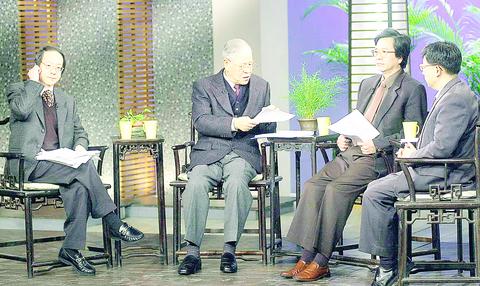Former president Lee Teng-hui (
Given that the war is over, the Temporary Provisions Effective During the Period of Communist Rebellion (

PHOTO: SEAN CHAO, TAIPEI TIMES
Lee also rejected the existence of the so-called "1992 consensus," which states two sides agree that there is "one China, with each side having its own interpretation."
While the KMT has urged the government to use the consensus to resume cross-strait dialogue on technical matters while temporarily shelving political issues, the DPP has questioned the existence of such a consensus.
Lee, who was leader of the country at the time the so-called consensus was reached, denies the KMT's claims.
"There is no such thing. Even I know nothing about it. What the KMT claims is utterly irrelevant as it is not a ruling party," Lee said.
The former president sought to shed light on the controversial notion and state the importance of forging a clear national identity while taking part in a program on TTV held by Chin Heng-wei (
Lee took the opportunity to pay his respects to late president Chiang Ching-kuo (
Dubbing Chiang "a remarkable political leader," Lee said Chiang had set the foundation for Taiwan's democratic development and it would be unfair for him alone to receive all the credit.
Lee said he had learned a lot about how to rule the country from Chiang and had vowed to adhere to his principles when he took over the presidency in 1988.
He said the concept of "New Taiwanese" was introduced as a result of Chiang's influence because, though a mainlander, Chiang had always considered himself Taiwanese.
On Sunday Lee said Chiang was seeking to consolidate his power when he started to recruit native Taiwanese in the government in the 1970s.
As one of Chiang's targets, Lee said he "felt used" when serving as a minister without portfolio.
Lee said yesterday that he didn't mean to criticize Chiang.
In the early 1970s, then-premier Chiang carried out a policy of recruiting a large number of younger Taiwanese into the KMT and the government, which was then dominated by old-guard KMT exiles from China.
The movement indirectly triggered the onset of localization in the KMT.
Political leaders such as Lee, KMT Chairman Lien Chan (連戰), former Judicial Yuan president Lin Yang-kang (林洋港) and former Judicial Yuan president Shih Chi-yang (施啟揚) are among the group.

Taiwan is to have nine extended holidays next year, led by a nine-day Lunar New Year break, the Cabinet announced yesterday. The nine-day Lunar New Year holiday next year matches the length of this year’s holiday, which featured six extended holidays. The increase in extended holidays is due to the Act on the Implementation of Commemorative and Festival Holidays (紀念日及節日實施條例), which was passed early last month with support from the opposition Chinese Nationalist Party (KMT) and Taiwan People’s Party. Under the new act, the day before Lunar New Year’s Eve is also a national holiday, and Labor Day would no longer be limited

COMMITMENTS: The company had a relatively low renewable ratio at 56 percent and did not have any goal to achieve 100 percent renewable energy, the report said Pegatron Corp ranked the lowest among five major final assembly suppliers in progressing toward Apple Inc’s commitment to be 100 percent carbon neutral by 2030, a Greenpeace East Asia report said yesterday. While Apple has set the goal of using 100 percent renewable energy across its entire business, supply chain and product lifecycle by 2030, carbon emissions from electronics manufacturing are rising globally due to increased energy consumption, it said. Given that carbon emissions from its supply chain accounted for more than half of its total emissions last year, Greenpeace East Asia evaluated the green transition performance of Apple’s five largest final

Taiwan is to extend its visa-waiver program for Philippine passport holders for another year, starting on Aug. 1, Minister of Foreign Affairs Lin Chia-lung (林佳龍) said on Friday. Lin made the announcement during a reception in Taipei marking the 127th anniversary of Philippine independence and the 50th anniversary of the establishment of the Manila Economic and Cultural Office (MECO) in Taiwan, the Ministry of Foreign Affairs said. The decision reflected Taiwan’s commitment to deepening exchanges with the Philippines, the statement cited Lin as saying, adding that it was a key partner under the New Southbound Policy launched in 2016. Lin also expressed hope

Temperatures in New Taipei City’s Sindian District (新店) climbed past 37°C yesterday, as the Central Weather Administration (CWA) issued heat alerts for 16 municipalities, warning the public of intense heat expected across Taiwan. The hottest location in Taiwan was in Sindian, where the mercury reached 37.5°C at about 2pm, according to CWA data. Taipei’s Shilin District (士林) recorded a temperature of 37.4°C at noon, Taitung County’s Jinfeng Township (金峰) at 12:50 pm logged a temperature of 37.4°C and Miaoli County’s Toufen Township (頭份) reached 36.7°C at 11:40am, the CWA said. The weather agency yesterday issued a yellow level information notice for Taipei, New